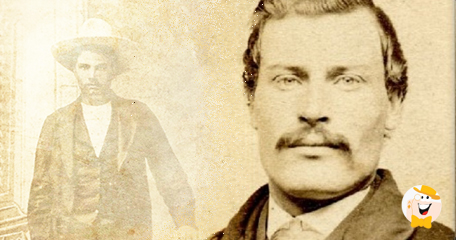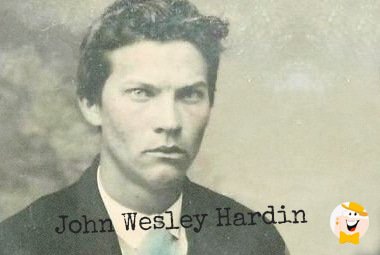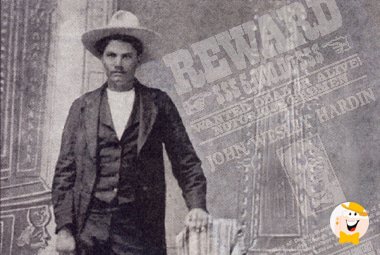
Why do PKs -- preachers' kids -- get into so much trouble?
That question might have been asked about John Wesley Hardin, a notorious outlaw, gunfighter and gambler who was born in Bonham, TX. in 1853. The exact number of people Hardin shot to death is not known, but some historical estimates put them at 47 or more.
Hardin even wrote an exaggerated book about his life while serving a 25-year prison term for murder. He cheerfully admitted to the killings and even added a few that probably didn't happen. After serving 17 years, he was released, pardoned and even passed the Texas State Bar exam and became a practicing attorney.
His father was a poor Methodist preacher and circuit rider who later became a school teacher. Hardin's parents named him after John Wesley, founder of the Methodist Church.
While in prison, Hardin described his mother Mary as 'blond, highly cultured and charitable.' In 1859, the family moved Hardin and his nine brothers and sisters to Sumpter, TX. where his father found a job teaching school.
In 1862 at the age of nine, Hardin sympathized with the South and tried to run away from home to join the Confederate Army. Authorities found him and returned him to his home.
He and his siblings attended the school where their father taught. In 1867, Hardin had an argument with another student over school graffiti, a poem about a female student that someone had left on the chalkboard. The kids went after each other with pocket knives and Hardin stabbed the other student so severely that he nearly died. His father nearly expelled young Hardin from school over the incident.

At the age of 15, Hardin challenged a former slave named Major 'Maje' Holshousen to a wrestling match, which he won. The following day, Maje ambushed him and charged at him with a big stick as he rode past. Hardin controlled his rearing horse, drew a revolver and shot the man five times.
He rode to get help but the badly wounded man died three days later.
In his autobiography, Hardin wrote that his father didn't feel he would get justice in the Union-occupied state where a third of the state police were former slaves and he sent his son into hiding.
Authorities eventually discovered his hiding place and went there to arrest him. Hardin's older brother, Joseph, warned him they were coming and Hardin met them with a double-barreled shotgun and a cap and ball pistol, killing three of his pursuers.
The young outlaw mounted his horse and went on the run. He teamed up with a fellow outlaw named Frank Polk who was also wanted for murder. They were pursued by soldiers who eventually captured Polk, but Hardin managed to escape.
He fled to another town and found a job teaching school. However, his new position did not stop his outlaw ways. Hardin became involved in several other shooting scrapes, killing a soldier and a black man in disputes. He also shot another man in the eye when they fought over a bottle of whiskey.
Gambling played a major role in many of his shooting incidents. On Jan. 5, 1870, Hardin was playing cards with Ben Bradley and was beating him soundly at the game. Bradley grew visibly upset and drew a pistol and knife, threatening to cut out Hardin's liver if he won another hand.
Hardin threw up his hands, claimed he was unarmed and left the game with his winnings. Later that night after some heavy drinking, Bradley went looking for him. He spotted Hardin on the street, drew his gun and fired. He missed. Hardin was armed with two pistols and he didn't. One shot struck Bradley in the head, the other in his chest, killing the man instantly.
The shooting was witnessed by dozens of people and Hardin escaped being charged.
He joined a cattle drive that followed the Chisolm Trail into Kansas in the summer of 1871. The cowboys and their herd ran into another herd being driven by Mexican vaqueros. They got into a dispute and Hardin got into a gunfight with one of the Mexicans whom he wounded in the thigh with a malfunctioning cap and ball pistol.
The two groups drew up a temporary truce, but Hardin's hair-trigger temper wouldn't let the matter be settled. Hardin borrowed a gun from one of the other cowboys and went looking for the Mexican. He found him. More shots were fired and the vaquero was left dead on the trail.
After the cowboys delivered the herd, Hardin collected his pay and met Wild Bill Hickok in another cattle town. Hardin respected Hickok for his ability with a gun and they became friends. Once he even surrendered his guns to Hickok politely and with a smile.
In 1872, Hardin decided it was time he settled down. He married Jane Bowen, an attractive young woman whose brother was a cattle rustler. Shortly after they were wed, he was severely wounded by a shotgun blast while playing poker in the Gates Saloon in Trinity, TX.

After he recovered from his wounds, Hardin surrendered his guns to a sheriff in Cherokee, County, TX. and allowed himself to be jailed. But once behind bars, he discovered how many murders the sheriff intended to charge him with.
Hardin changed his mind. Using a smuggled hacksaw, he cut his way out of jail and fled from town on horseback.
The law finally caught up with Hardin in June 1878. At the age of 40, he was captured, tried and convicted of murder. The judge sentenced him to 25 years in prison.
He tried unsuccessfully to escape from prison several times. Eventually, he settled down to prison life and began reading books on theology and the law. He was even named superintendent of the Prison Sunday School.
On Feb. 17, 1894, after serving 17 years, Hardin was released from prison. He was given a pardon and he even passed the Texas Bar Exam, obtaining his license to practice law. His wife had died while he was in prison and he moved to El Paso, TX.
Hee married a 15-year-old girl named Callie Lewis. The marriage didn't last long and was never annulled.
One evening he was shooting dice in the Acme Saloon. Earlier in the day, he had had an altercation with the son of John Selman Sr., a former outlaw who was a constable in El Paso.
Selman came up behind Hardin and shot him in the back of the head, killing Hardin instantly. He told prosecutors that Hardin had reached for his gun and that he killed him in self-defense. His story was believed and he was not charged with killing the outlaw son of a preacher man.






Geno 5 years ago
5 years ago
Being the son of a preacher man does present a kid with a lot of problems. There was a popular rock song during my childhood that was sung by a female vocalist about her relationship with the son of a preacher man. And who could forget the movie, 'Elmer Gantry'? Take care, Jade.
Please enter your comment.
Your comment is added.
jade 5 years ago
5 years ago
Whoa! I have to admit it was very interesting reading and despite the fact that it sure ties in with the last few stories I've read of yours today, why in the world did that pop into your head? Interesting because: he started so young, he was from such a big family, his father the preacher helped him get away, an outlaw...
Whoa! I have to admit it was very interesting reading and despite the fact that it sure ties in with the last few stories I've read of yours today, why in the world did that pop into your head? Interesting because: he started so young, he was from such a big family, his father the preacher helped him get away, an outlaw that thinks it's time to settle down and does it, just the fact that he wasn't hanged, was pardoned and the irony of it all, this guy, shoots him in the back of the head claims self defense and gets away with it. This story brings up way more questions than it gives answers, don't ya think....... ha, ha, ha...... I did enjoy it......
Show morePlease enter your comment.
Your comment is added.